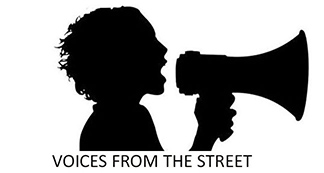Carol Goar
April 11 2007
They’d battled drug addiction, cancer, racism, sexual abuse and mental illness, but they all agreed one foe was harder to beat than any of them poverty.
Once a person loses everything – home, job, income, possessions and dignity – the will to fight wanes. Obstacles become insurmountable. Isolation sets in.
“Being poor changes everything from what you eat to the kind of toilet paper you use,” said Mike Creek, who lost his livelihood when he contracted Hodgkin’s lymphoma.
“I’ve been clean for three years,” said Mark Dukes, who pulled himself out of a self-made hell of drug abuse and homelessness. “The poverty? Let’s just say that’s a work-in-progress.”
Marcia Jarman sought help to escape a violently abusive spouse. “They sent me to a financial counselling service to find out how to budget my money,” she recalled bitterly. “Well, I don’t have any money to budget.”
The people telling their stories belong to a group called Voices from the Street. Its members learn to speak publicly about living in poverty, to bring their views to community organizations and to put a human face on a problem often reduced to statistics and stereotypes.
Last year, 10 Torontonians went through the training. They have spoken at city hall, the University of Toronto, the Centre for Addiction and Mental Health, St. Michael’s Hospital, service clubs and community forums.
This year, 75 people applied for the program and 15 were chosen. They’ve now been together for four weeks.
They allowed a journalist to sit in on a recent workshop, as they learned how to weave the broken threads of their lives into a coherent narrative, deliver a strong message and keep their anxiety from showing.
Author and anti-poverty activist Pat Capponi was the facilitator. She has lived in psychiatric institutions and decrepit rooming houses, gone hungry and been beaten. She seemed to know what each person needed gentle encouragement, a firm prod, an arm around the shoulders, respectful silence.
“I love this,” she said. “It’s the most therapeutic thing to take your anger and all the shitty things that have happened to you and use them in a constructive way.”
The paths that brought the participants to the Parkdale Activity Resource Centre varied, but they had all experienced poverty, homelessness and stigmatization.
Mohamed Gedi – nicknamed Eddie – spoke first. He arrived from Somalia with his older sister in 1990. When she got married, she kicked him out of the house. He was 14.
The police took him to the Children’s Aid Society and he spent the next few years in a succession of foster homes and group homes. “I used to get scared,” he said. “When I’d come home to the shelter, there would always be drugs and police.”
Now he is adrift with no home, no livelihood and no family ties. He didn’t choose poverty. It was his only choice.
Connie Harrison was told to vacate her Riverdale apartment one week after breast cancer surgery. Her landlady had decided to renovate.
Rather than go to a woman’s shelter as social workers proposed, she moved to a seedy hotel on Kingston Rd. so she could stay with her husband. The nurse who came to dress her radiation burns had to pick her way past hookers. The fighting and yelling never stopped.
“Everybody thinks breast cancer is sexy (she was referring to pink ribbon fundraisers, fashion shows and ads), but it sure wasn’t sexy for me.”
Donna Akiwenzie, who is Ojibway, left Cape Croker with her family because of the violence and alcohol on the reserve. But Toronto was no nirvana. “They called me an Indian in school. My family split. I started to look for people who drank and laughed like my parents. I was 11.”
From there, her life spiralled into a series of bad relationships, mental health problems and clashes with police. For all her toughness, Akiwenzie shook so badly when she tried to tell her story that she had to sit down. Capponi assured her it would get easier with time.
Miguel Dyer thought he’d escaped poverty when he made it as a reggae star in New York and the Caribbean. For a few years, he was on top of the world. Then he crashed. At 26, he was diagnosed with bipolar disorder. He’s been in the mental health system ever since. He recently got a job at a cafe employing psychiatric survivors. “I’ve been given a second chance at life,” he said. “That is why I am speaking out.”
Some of the stories were too fragmentary to put in a newspaper. Others were too unfocused. But no one broke Capponi’s three cardinal rules No melodrama, no slickness and don’t bleed all over the place.
By the end of their training, all 15 participants will be able to stand in front of an audience and talk about the realities of poverty. They might not be polished speakers. They might still be terrified.
But no one can tell their stories like they can.
Credit: Toronto Star
